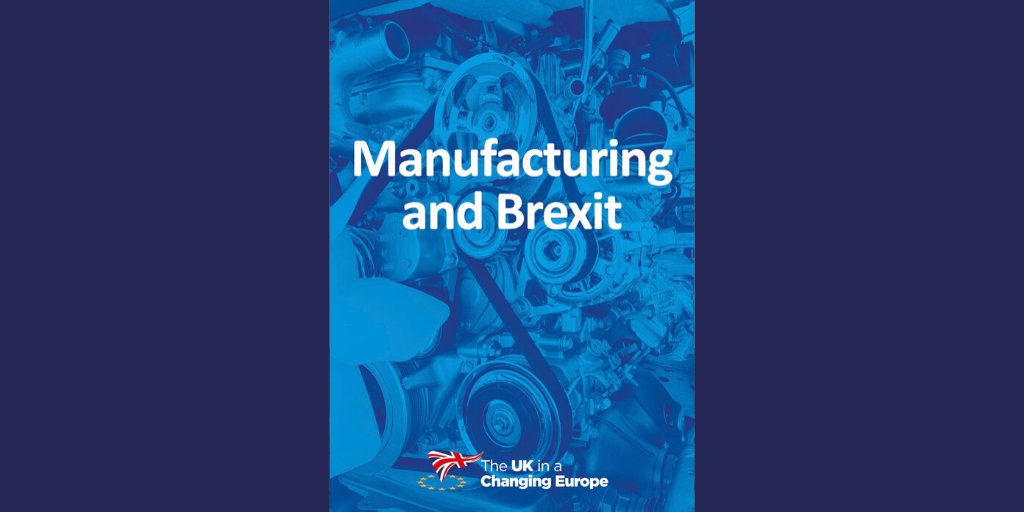It's that time again, it's #ThursdayThread time. ⏰
Earlier this week, we released a new report by @dgbailey and @IvanRajicUK, looking at how the manufacturing sector will be impacted by #Brexit.
Want some highlights? Then carry on reading...
#ManufacturingBrexit
Earlier this week, we released a new report by @dgbailey and @IvanRajicUK, looking at how the manufacturing sector will be impacted by #Brexit.
Want some highlights? Then carry on reading...
#ManufacturingBrexit

Manufacturing makes up around 10% of the UK economy and 9% of private sector employment.
It provides close to half of UK exports and around 60% of private sector investment.
It provides close to half of UK exports and around 60% of private sector investment.

Manufacturing typically has higher productivity and wages than average for the economy as a whole. 📈 

Disruption to manufacturing from Brexit would have a sizeable negative impact on the wider UK economy.
UK manufacturing is highly integrated with the 🇪🇺 single market – nearly 1/2 of all goods imports and exports come from or go to the EU.
UK manufacturing is highly integrated with the 🇪🇺 single market – nearly 1/2 of all goods imports and exports come from or go to the EU.

The consequences will be worst with no deal.
Nearly all #manufacturing sectors worry about a lack of regulatory alignment with the #EU and the bulk want continued free trade.
Some such as automotive could suffer a severe blow from tariffs or if there are no common regulations.
Nearly all #manufacturing sectors worry about a lack of regulatory alignment with the #EU and the bulk want continued free trade.
Some such as automotive could suffer a severe blow from tariffs or if there are no common regulations.

That said, some sectors will face fewer disruptions.
For example, even with no-trade deal, aerospace will likely face no tariffs, as international trade in the sector is mostly tariff-free.
But even in these sectors, firms are worried about regulatory hurdles.
For example, even with no-trade deal, aerospace will likely face no tariffs, as international trade in the sector is mostly tariff-free.
But even in these sectors, firms are worried about regulatory hurdles.
In most cases, Brexit will create additional costs for companies. 💳
This can be due to tariffs, customs declarations, certification costs, rules of origin compliance, loss of collaboration in R&D, border delays, EU customers switching suppliers, visa costs for EU workers, etc
This can be due to tariffs, customs declarations, certification costs, rules of origin compliance, loss of collaboration in R&D, border delays, EU customers switching suppliers, visa costs for EU workers, etc
Manufacturers are concerned first and foremost about the UK falling out of common EU regulations.
Uncertainty about the UK-EU relationship is making it difficult for manufacturers to prepare and this uncertainty has already contributed to falling investment. 📉
Uncertainty about the UK-EU relationship is making it difficult for manufacturers to prepare and this uncertainty has already contributed to falling investment. 📉
Above all, they want to avoid a no-trade deal scenario, especially in the wake of the hit to the economy from Covid-19.
The government could introduce more measures to cushion the post-Brexit shock, such as loans, wage subsides, taking equity stakes in companies, etc.
The government could introduce more measures to cushion the post-Brexit shock, such as loans, wage subsides, taking equity stakes in companies, etc.
Long-term more power could be transferred to UK’s regions and devolved institutions.
A range of policies on issues such as skills, R&D, financial support for firms and advisory support could be more firmly integrated within an overarching industrial policy.
A range of policies on issues such as skills, R&D, financial support for firms and advisory support could be more firmly integrated within an overarching industrial policy.
This would mean a ‘policy reset’, with a need to invest more into an industrial policy, bringing the UK in line with other advanced economies.
Specific sectors or regions could be targeted, and in particular firms can be helped to take advantage of new technologies.
Specific sectors or regions could be targeted, and in particular firms can be helped to take advantage of new technologies.
Fancy reading some more?
Here's a link to the full #ManufacturingBrexit report⬇️
ukandeu.ac.uk/wp-content/upl…
Until next week....
Here's a link to the full #ManufacturingBrexit report⬇️
ukandeu.ac.uk/wp-content/upl…
Until next week....
• • •
Missing some Tweet in this thread? You can try to
force a refresh









